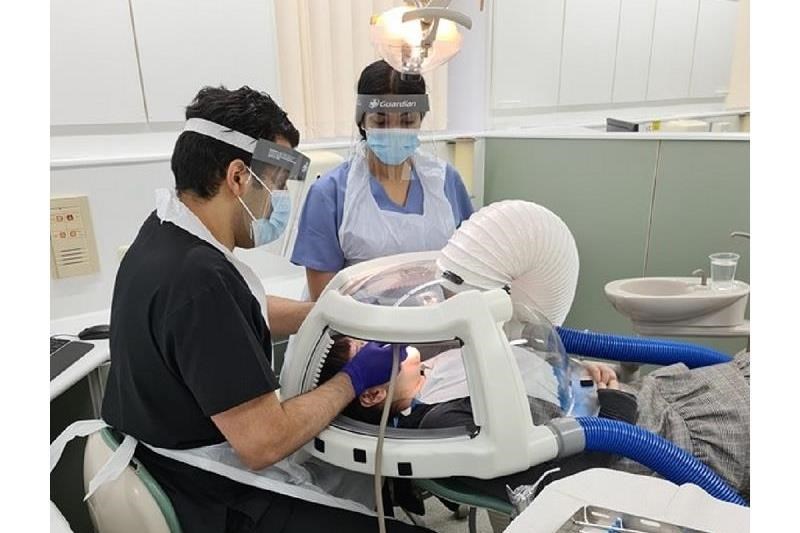New environmentally-friendly shield could offer better protection during dental surgery
Dental patients and practitioners could be better protected from Covid-19 and other airborne viruses and bacteria thanks to the development of a new environmentally-friendly shield by a multidisciplinary team from the University of Bristol and University Hospitals Bristol and Weston NHS Foundation Trust (UHBW).
Published: 18/01/2022
The shield could also increase the number of patients seen by dentists and help reduce procedure wait times.
The device, called NoPaS (Novel Patient Shield), is designed to protect patients and practitioners from harmful diseases including Covid-19, which can be spread through aerosols generated during dental procedures. The device could also significantly cut clinical waste, including the use of disposable personal protective equipment (PPE).
Covid-19 has significantly reduced access to dental care. In the first lockdown routine dental treatments, such as fillings and root canal treatment, were suspended and have not yet returned to its pre-pandemic capacity. Many dental procedures are ‘aerosol generating procedures’ (AGPs). These aerosols could carry virus particles or bacteria that risk the spread of Covid-19 and other diseases.
Dr Mojtaba Dorri, consultant in restorative dentistry in the Bristol Dental School and University Hospitals Bristol & Weston NHS Foundation Trust (UHBW), who led the development of NoPaS, said, “During the Covid-19 pandemic, the development of innovative environmentally-friendly solutions have been much needed to allow routine dental care to be delivered in a safe environment without risking virus transmission. With the virus still circulating and the chance of future pandemics, it is important routine dental care continues to ensure public oral health is not affected.
“With minor modification, NoPaS can be used for medical procedures on the head and neck, including endoscopy, anaesthetics and ear, nose and throat.
“Thanks to the Elizabeth Blackwell Institute, MRC Confidence in Concept and Bristol and Weston Hospitals Charity (formerly Above & Beyond) grants, our NoPaS prototype has been fully tested. With the device now patented, we are actively seeking partnerships to take NoPaS into mass production.”
In England, 19 million NHS dental appointments and eight million courses of dental treatments were missed between March 2020 and April 2021. Suspension of routine dentistry led to the increased use of antibiotics - by 25 per cent in England - and dental extraction for otherwise treatable dental diseases.
The recommended 15 to 60 minutes fallow period after any AGP has led to most UK dental practices operating at less than half their pre-pandemic capacity and almost half are unable to maintain their financial sustainability for the next year. Currently, some patients in England are being put on a three-year waiting list. The recommended additional PPE for AGPs increases the clinical waste significantly and poses a risk to the environment. Experts also suggest that transmission of Covid-19 and other airborne infections will be a risk for the foreseeable future.
Author: N/A











.jpg?width=150&height=100&scale=canvas)

